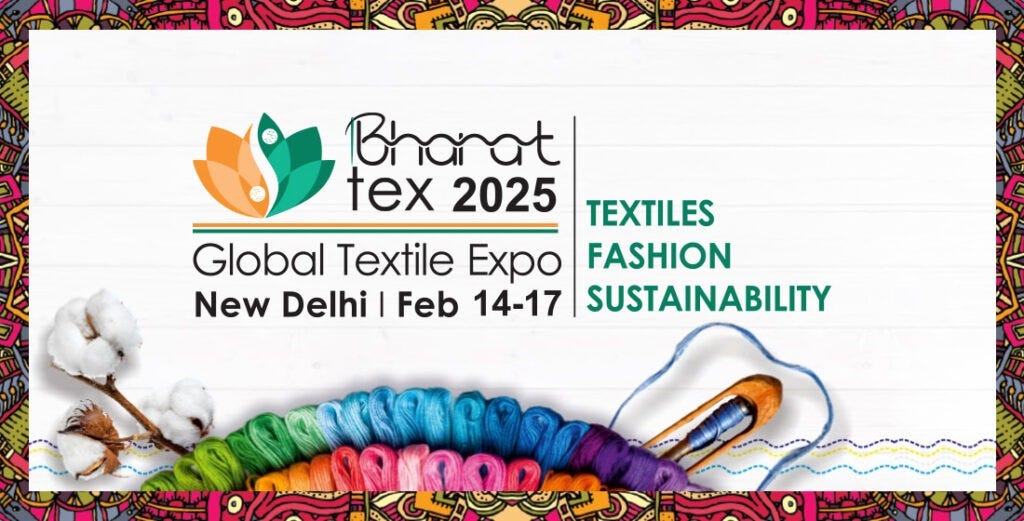Bharat Tex 2025: New Delhi ready to host the global textile event in February

The textile industry, an integral pillar of India’s economy, is ready to showcase its strength at Bharat Tex 2025, a global textile event scheduled for February 12-17, 2025, in New Delhi. The event will showcase India's leadership in textile innovation, sustainability, and its rich cultural heritage.
The industry currently contributes 2.3 per cent to India's GDP and provides employment to over 100 million people, both directly and indirectly. From the handwoven artistry of khadi and silk to cutting-edge technical textiles, the sector seamlessly blends tradition with modernity. This blend is further strengthened by the ‘5F Vision’ – Farm, Fibre, Fabric, Fashion, and Foreign markets – which underpins a robust supply chain from production to retail.
Shaping global competitiveness
While cost-effectiveness has been its strength, the Indian textile industry is evolving to meet the demands of fast fashion and the growing technical textiles market. Moving beyond its historical reliance on cotton, India is actively expanding its synthetic fiber production, supported by initiatives like the National Technical Textiles Mission (NTTM). This diversification is driving competitiveness in key sectors such as healthcare, automotive, and agriculture.
Policy initiatives are playing a crucial role in this transformation. The PM MITRA Textile Parks aim to create integrated production ecosystems, while the PLI Scheme is incentivizing investments in man-made fibers (MMF) and technical textiles. The NTTM further focuses on research and development to solidify India’s global leadership in technical textiles, and the Samarth Scheme enhances workforce skills, boosting productivity and quality across the sector.
Sustainability, a strategic imperative
India's textile industry is emerging as a global leader in sustainable practices, embracing renewable energy, ethical labor standards, and water-efficient processes. This commitment aligns with a national decarbonization agenda, positioning India at the forefront of sustainable textile production. Initiatives promoting solar energy adoption and waste reduction are standardizing eco-friendly practices, addressing both environmental concerns and growing market demand.
"Sustainability is not just a trend; it's a fundamental shift in how we operate," a representative from a leading textile manufacturer stated. "We are investing heavily in eco-friendly technologies and processes to minimize our environmental footprint and meet the increasing demand for sustainable products."
Empowering the workforce
The industry's vast workforce presents a unique opportunity to combine traditional skills with modern technologies like automation and CAD. Skill development programs targeting rural areas and underrepresented groups, particularly women, are fostering an inclusive workforce, a crucial factor for global competitiveness.
Bharat Tex 2025, a global showcase
Bharat Tex 2025, spanning 2.2 million sq. ft., will host 5,000 exhibitors and attract over 18,000 buyers from 110 countries. The event has several highlights:
- Sustainability Pavilion: Showcasing eco-friendly practices and innovations.
- Start-Up Innovation Pavilion: Highlighting cutting-edge textile technologies.
- Craft Museum – Indi Bhaat: Celebrating India’s rich artistic and weaving traditions.
The event is supported by major industry players such as Reliance Industries, Aditya Birla, and Welspun, and will include knowledge sessions and masterclasses focusing on ESG strategies, circularity, and cutting-edge innovations in textiles.
Driving global innovation and collaboration
Bharat Tex 2025 will serve as a platform for dialogue between global leaders, industry experts, and government entities, fostering partnerships with UN agencies and think tanks like NITI Aayog. The event's strong focus on sustainability, technological modernization, and strategic collaborations aims to set new benchmarks for the Indian textile industry.
With projections indicating the sector will reach $350 billion by 2030 and generate 35 million jobs, India's textile industry is on a transformative path. By integrating innovation, sustainability, and its rich heritage, India is ready to lead the global textile market, shaping an era of inclusive and sustainable growth. As an industry leader noted, "Bharat Tex 2025 is not just an exhibition; it's a testament to India's commitment to shaping the future of textiles globally."
